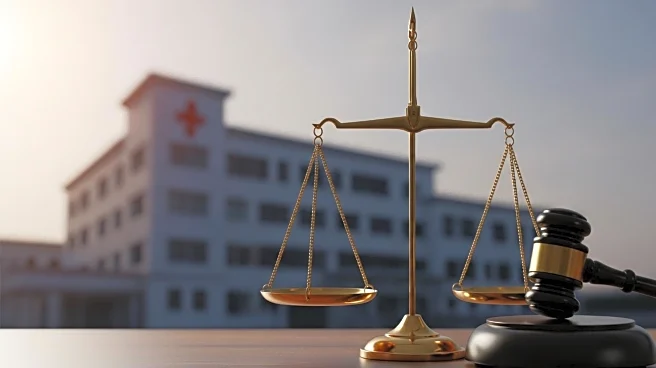What is the story about?
What's Happening?
Prime Minister Benjamin Netanyahu has publicly disputed a United Nations report that highlights severe acute malnutrition and potential famine conditions in Gaza. The report, which Netanyahu labeled as 'blood libel,' comes amid ongoing tensions and military actions in the region. Recently, an Israeli strike on Nasser Hospital in Khan Yunis resulted in the deaths of several healthcare and media workers, including Moaz Abu Taha, a photographer who had been documenting the conditions. Journalists Yarden Michaeli and Nir Hasson, barred from entering Gaza, conducted virtual tours of the hospital, revealing distressing scenes of malnourished children with visible signs of starvation, such as changes in hair color, missing teeth, and skin rashes. Experts warn that these conditions are indicative of a large-scale famine, with signs already visible in adults, suggesting an advanced stage of the crisis.
Why It's Important?
The situation in Gaza has significant implications for international relations and humanitarian efforts. Netanyahu's dismissal of the UN report could affect diplomatic relations and the perception of Israel's actions in the region. The humanitarian crisis, marked by severe malnutrition and potential famine, poses a challenge to global health organizations and aid agencies striving to provide relief. The ongoing conflict and restrictions on media access complicate efforts to address the crisis and raise awareness. The impact on Gaza's population, particularly children, underscores the urgent need for intervention and support from the international community.
What's Next?
The international community may increase pressure on Israel to allow humanitarian aid and media access to Gaza. Diplomatic efforts could intensify to address the humanitarian crisis and seek resolutions to the ongoing conflict. Human rights organizations and global health agencies might advocate for increased support and intervention to prevent further deterioration of conditions in Gaza. The situation could lead to heightened scrutiny of Israel's policies and actions, potentially influencing future diplomatic negotiations and peace talks.
Beyond the Headlines
The crisis in Gaza highlights broader ethical and legal concerns regarding the treatment of civilians in conflict zones. The restrictions on media access raise questions about transparency and accountability in reporting humanitarian issues. The visible signs of starvation among children and adults in Gaza may prompt discussions on the long-term impact of conflict on public health and the responsibilities of international actors in providing aid and support. The situation could also influence cultural perceptions and narratives surrounding the Israeli-Palestinian conflict.















